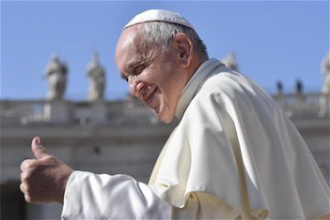Sunday Reflection with Fr Terry - 29 January 2012

I remember reading about a television interview with Mother Teresa of Calcutta in the United States. The interview bowled along, and then the interviewer paused the live broadcast for a commercial break: 'We will continue with this interview in a minute or two, but first, listen to this message from our sponsors.' As the commercials were shown, the studio suddenly fell silent. Everybody present suddenly saw the commercials in a new light. Many of the goods advertised seemed silly, indulgent or narcissistic. Mother Teresa had been speaking about ministering alongside the homeless sick and dying. There was a glaring contrast between her world and the world of 'must-have' goods being advertised, many of which were in fact unnecessary. Simply having her in their midst had made the studio crew see things in a new light.
It must have been the same with Jesus. We think of him, and rightly so, as the love of God among us. His mercy, compassion and love towards us are a great reassurance in our lives, with all their tensions, difficulties and disappointments. Yet at the same time, precisely because he is the love of God among us, Christ must at times challenge us. If we were to walk through our world knowing Christ was walking alongside us, would we not see it and ourselves in a new light? Things that we took seriously - the latest fashion, the new fad - might seem a whole lot less important. Things that previously we hardly noticed - the broken-hearted person, the incident of injustice, the glaring poverty - might now challenge us powerfully.
In the gospel today, we hear that Jesus impressed his listeners, because 'he taught them with authority' (Mark 1.22). This was the authority not of power but of love. It was the authority not of force but of integrity. The nature of the man shone through him, and was a sign that here and now God was doing a wonderful thing. This authority that shone through him would lead those who followed him to see the world in a new light.
This is the clue to the exorcism which immediately follows. There is a common sense point here: Jesus must time carefully the revelation that he is the long-awaited Messiah, the Holy One from God and of God. This is too important and too sensitive a matter to be left to the ravings of a stranger. There is also a deeper point here, for the people noted that he could overcome even 'unclean spirits' (1.27). Many such exorcisms would follow over the next three years, and it is a sign that Jesus comes not only to preach and to heal, but also to confront. People had a strong sense of the forces that oppressed them. Sometimes they came from within, in the form of mental illness, stress, depression. Sometimes the oppression came from outside, in the form of poverty, communal despair, the lack of any sense of direction in society. Sometimes it was the usual flaws of human nature, our tendency to seek luxury or to care only for our own welfare, even at the expense of others. Whatever form it took, Christ was there not only to encourage and to bless, but also to challenge and confront the destructive forces. He could not be who he was and leave things as they were. From now on, wherever Jesus was present, those who heard him would see the world differently, and would know that the love of God was breaking into that world with all its pains and conflicts. No wonder the unclean spirits trembled.
A final word about the second reading. It seems to propose that married people can give less time and attention to the things of God. Paul wrote this in the expectation that the Second Coming was imminent, and that it would be a cosmic event, hence his desire for people to be free to prepare for it. But I take a very different point from this reading that at first glance seems so out of kilter with our modern times. I refer to its implicit equality of the genders. Husbands are to devote themselves to their wives, and wives to their husbands. They are equal in their devotion to one another. Moreover, both husbands and wives are expected to be involved in the world around them, not just the menfolk. This sounds to me like a wonderful equality and complementarity.
Fr Terry is Parish Priest at St Mary's in Finchley East, north London. Fr Terry's latest book: Ronald Knox and English Catholicism is published by Gracewing at £12.99 and is available on Amazon, on ICN's front page. To read Sr Gemma Simmonds' review on ICN see: www.indcatholicnews.com/news.php?viewStory=1611


















